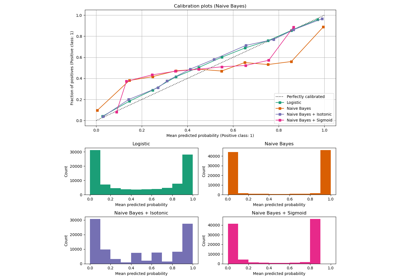W3cubDocs
/scikit-learnsklearn.metrics.precision_score
-
sklearn.metrics.precision_score(y_true, y_pred, labels=None, pos_label=1, average='binary', sample_weight=None)[source] -
Compute the precision
The precision is the ratio
tp / (tp + fp)wheretpis the number of true positives andfpthe number of false positives. The precision is intuitively the ability of the classifier not to label as positive a sample that is negative.The best value is 1 and the worst value is 0.
Read more in the User Guide.
Parameters: y_true : 1d array-like, or label indicator array / sparse matrix
Ground truth (correct) target values.
y_pred : 1d array-like, or label indicator array / sparse matrix
Estimated targets as returned by a classifier.
labels : list, optional
The set of labels to include when
average != 'binary', and their order ifaverage is None. Labels present in the data can be excluded, for example to calculate a multiclass average ignoring a majority negative class, while labels not present in the data will result in 0 components in a macro average. For multilabel targets, labels are column indices. By default, all labels iny_trueandy_predare used in sorted order.Changed in version 0.17: parameter labels improved for multiclass problem.
pos_label : str or int, 1 by default
The class to report if
average='binary'and the data is binary. If the data are multiclass or multilabel, this will be ignored; settinglabels=[pos_label]andaverage != 'binary'will report scores for that label only.average : string, [None, ‘binary’ (default), ‘micro’, ‘macro’, ‘samples’, ‘weighted’]
This parameter is required for multiclass/multilabel targets. If
None, the scores for each class are returned. Otherwise, this determines the type of averaging performed on the data:-
'binary': -
Only report results for the class specified by
pos_label. This is applicable only if targets (y_{true,pred}) are binary. -
'micro': -
Calculate metrics globally by counting the total true positives, false negatives and false positives.
-
'macro': -
Calculate metrics for each label, and find their unweighted mean. This does not take label imbalance into account.
-
'weighted': -
Calculate metrics for each label, and find their average, weighted by support (the number of true instances for each label). This alters ‘macro’ to account for label imbalance; it can result in an F-score that is not between precision and recall.
-
'samples': -
Calculate metrics for each instance, and find their average (only meaningful for multilabel classification where this differs from
accuracy_score).
sample_weight : array-like of shape = [n_samples], optional
Sample weights.
Returns: precision : float (if average is not None) or array of float, shape = [n_unique_labels]
Precision of the positive class in binary classification or weighted average of the precision of each class for the multiclass task.
Examples
>>> from sklearn.metrics import precision_score >>> y_true = [0, 1, 2, 0, 1, 2] >>> y_pred = [0, 2, 1, 0, 0, 1] >>> precision_score(y_true, y_pred, average='macro') 0.22... >>> precision_score(y_true, y_pred, average='micro') 0.33... >>> precision_score(y_true, y_pred, average='weighted') ... 0.22... >>> precision_score(y_true, y_pred, average=None) array([ 0.66..., 0. , 0. ])
-
Examples using sklearn.metrics.precision_score
© 2007–2016 The scikit-learn developers
Licensed under the 3-clause BSD License.
http://scikit-learn.org/stable/modules/generated/sklearn.metrics.precision_score.html
